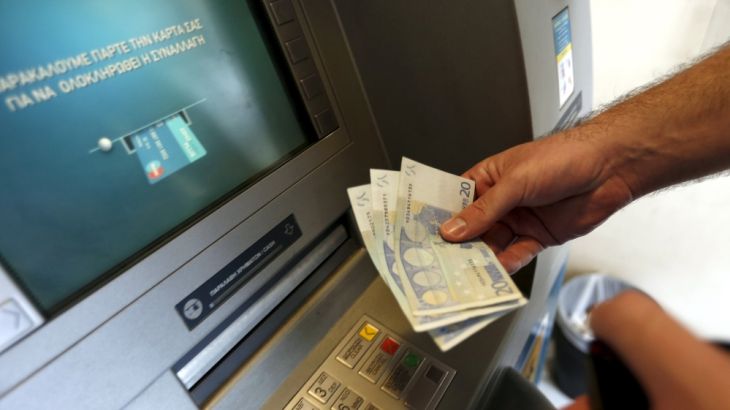Greece misses IMF payment
Country becomes first developed nation to default on IMF payment after midnight deadline for $1.8bn payment passes.

Greece slipped deeper into its financial abyss after the bailout programme it has relied on for five years expired at midnight on Tuesday and the country failed to repay a loan due to the International Monetary Fund (IMF).
With its failure to repay the roughly $1.8bn to the IMF, Greece became the first developed country to fall into arrears on payments to the fund. The last country to do so was Zimbabwe in 2001.
Keep reading
list of 4 itemsEcuador weighs security, international arbitration in latest referendum
‘Triple spending’: Zimbabweans bear cost of changing to new ZiG currency
Boeing hit with 32 whistleblower claims, as dead worker’s case reviewed
| Greece defaults. What happens next? |
|
On Tuesday, Greece had the dubious distinction of joining the unique club of countries that failed to repay the International Monetary Fund, becoming the first developed nation to miss a payment. The list includes Zimbabwe, Somalia and Sudan. Failure to repay the IMF could push the European Central Bank on Wednesday to ask Greek banks for more assets if they want more money. The ECB has been keeping Greek banks alive with 89bn euros of emergency funding. It capped the funding after the referendum was called, which forced the banks to shut their doors. Many banks don’t have collateral to hand over, the speculation is that at least one bank could fold. At the same time the eurogroup of finance ministers are meeting to discuss a last-ditch proposal for another 30bn euro bailout for Athens. Merkel has already dismissed that proposal, saying nothing will be decided until after the referendum. While the situation looks financially perilous for Greece the prospect of Greece leaving the euro remains negligible. Abid Ali, business editor |
After Greece made a last-ditch effort to extend its bailout, eurozone finance ministers decided in a teleconference late on Tuesday that there was no way they could reach a deal before the deadline.
“It would be crazy to extend the programme,” said Dutch Finance Minister Jeroen Dijsselbleom, who heads the eurozone finance ministers’ body known as the Eurogroup. “So that cannot happen and will not happen.”
“The programme expires tonight,” Dijsselbleom said.
IMF spokesman Gerry Rice confirmed that Athens had missed its payment deadline.
“We have informed our executive board that Greece is now in arrears and can only receive IMF financing once the arrears are cleared,” he said.
He said the board would consider a Greek request to extend the loan.
Overall, Greece owes the IMF close to $40bn.
Related: More than a referendum: Will Greece exit the West?
In Athens on Tuesday, thousands of Greeks rallied in favour of the country remaining with the EU, in contrast to anti-EU protests on Monday.
The European Commission – one of Greece’s “troika” of creditors along with the IMF and the eurozone’s European Central Bank – wants Athens to raise taxes and cut welfare spending to meet its debt obligations.
Prime Minister Alexis Tsipras has called a referendum on Sunday on whether to reject creditors’ reform demands.
Al Jazeera’s Barnaby Phillips, reporting from Athens, said many pro-EU protesters put the blame for Greece’s predicament on Tsipras.
“They say he’s playing a dangerous position and putting his party’s interests above his country,” our correspondent said.
“There are wildly different predictions on how Greeks will vote in a referendum. All we do know is that the divisions in this society are growing deeper and deeper.”
Greece has debt worth nearly 180 percent of its GDP after receiving two bailouts worth $266bn since 2010.
Unemployment has more than doubled since 2009 to 25.6 percent and pensions and benefits have roughly halved between 2010 and 2014.
The European Central Bank’s (ECB) governing council will meet on Wednesday to discuss the crisis.